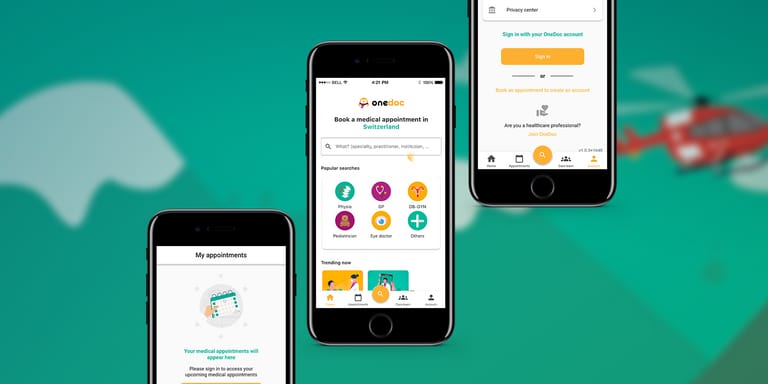What is OneDoc?
It was back in 2017 that two EPFL graduates, Arthur Germain and Alexandre Curreli, identified a huge need in the Swiss healthcare system. They decided to create OneDoc to simplify booking medical appointments. Today, with more than 5'000 healthcare professionals and institutions and 2 million registered patients, OneDoc has become the first online booking platform for medical appointments in Switzerland.
OneDoc serves both the patients and the health practitioners:
- For patients: OneDoc is a platform that enables people to find the right health professional and book an appointment, access their past and future bookings, as well as their care team, all in one click.
- For health professionals: OneDoc is a digital solution integrated with their medical software that helps them manage their patients’ appointments.
In late 2021, Arthur approached Liip with a mobile app project. The Covid pandemic in 2020 had led to an explosion in the number of registrations and appointments booked on the platform. OneDoc was to meet the ever-growing patients’ need to book not only their regular medical appointments, but also their many appointments for Covid-19 tests in all their forms.
Why a mobile application after all?
In this context, OneDoc wanted to offer the platform with all the advantages a mobile application can bring, like quick and easy access to all the OneDoc platform services, for example. Instead of having to open a browser and then find one’s login information, the OneDoc app provides easy access to all the patients’ services, such as:
- Search engine: to find a health practitioner or institution and access their info (contact, profile, medical specialisation, etc.)
- Online booking of new appointments: for oneself or someone else
- My appointments: the app keeps a record of all past and future appointments made on OneDoc
- My care team: the app lists all the health practitioners the patients have booked a consultation with via OneDoc
This is particularly valuable for patients who need to make regular appointments with the same health practitioners. Now all they have to do is open the app, when before they always had to keep a tab open in their browser to have quicker access to the platform.
Having an app on top of having a website offers other advantages:
- Smoother and a more pleasant experience with qualitative User Interface (UI) and Experience (UX), for example when they need to find a health practitioner close by, add an appointment to their calendar or call the health practitioner. A mobile app lets patients do all the above in one click!
- Offline access to appointments and the individual care team
- Faster than a web app, and without having to depend on the quality of the users’ connection
A big win for all
With patients using a mobile app, every stakeholder gets multiple advantages – Everybody wins!
- More value for the patients: the mobile app completes the digital suite of tools offered by OneDoc and makes their lives easier
- More traffic for OneDoc and the health practitioners: the app creates a higher engagement, coupled with increased patient loyalty and retention
Our approach
Our multidisciplinary team supported the OneDoc development team during the whole implementation journey. We organised workshops and had deep discussions with the team to ensure we had a clear understanding of how their platform works. This step was vital to be able to offer a performing app, i.e. one the users love because they can access what they need quickly, easily and intuitively.
Our UX Designer started by establishing the user journey mapping to understand precisely the booking funnel with all its subtleties: Is the patient a newcomer? What are the languages the health practitioners speak? What is their gender? Do they offer remote consultations? To which insurance network do they belong? Who is the appointment for? And so on.
After the conception and user experience phase, we started developing. Our mobile application developers coded a first version, using agile methods in close collaboration with the OneDoc team.
The application was then handed over to the OneDoc development team, allowing them to take full ownership and be autonomous in future developments.

